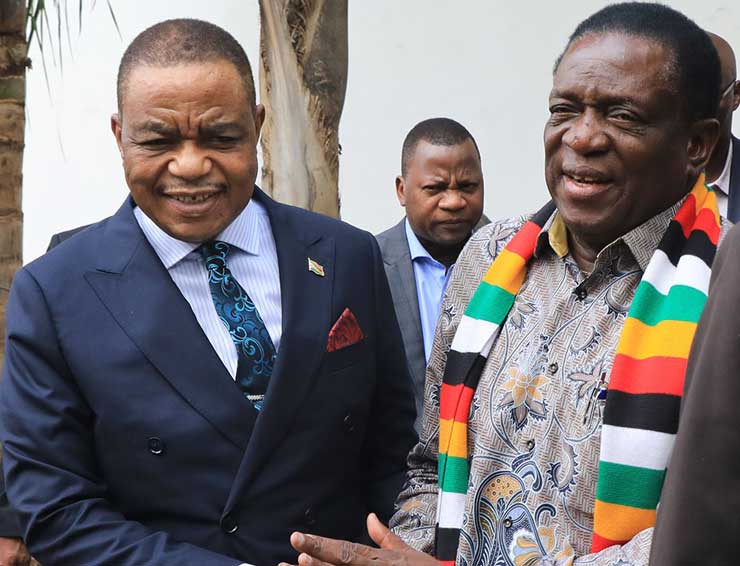
BY TATIRA ZWINOIRA
FINANCE minister Mthuli Ncube has ruled out a return to dollarisation, as he maintained that huge pockets of the market required the free falling domestic unit.
In an interview with Standardbusiness after attending an event to relist Tanganda Tea Company on the Zimbabwe Stock Exchange last week, Ncube said companies required local dollars to buy foreign currency on the forex auction system.
He said significant pockets of the economy were still paying taxes in Zimbabwe dollars, making it important to maintain the local unit to trade along with the United States dollar.
The Finance minister spoke amid a groundswell of anger across markets that have seen unsettled by the pace of decimation of the local unit against the US dollar.
He said instead of decommissioning the currency for the second time in a decade, he was working around the clock to stabilise the exchange rate.
“We are dealing with issues about market design in terms of strengthening the auction, fine tuning it and getting rid of the backlog,” Ncube said.
“Also, Treasury, every week puts into the market about US$15 million so all of that, in my view will go a long way in achieving a stable domestic currency.”
- Chamisa under fire over US$120K donation
- Mavhunga puts DeMbare into Chibuku quarterfinals
- Pension funds bet on Cabora Bassa oilfields
- Councils defy govt fire tender directive
Keep Reading
The Zimbabwe dollar has retreated significantly on the parallel market, depreciating from about US$1:$120 in January last year to about US$1:$230 currently.
The bloodbath has also been significant on the foreign currency auction system, where it is trading at US$1:$116,65 this week, from US$1:$108,66 on January 1, 2022.
Zimbabwe dollarised in 2009 after the currency collapsed under 500 billion percent inflation in December 2008.
Ncube reintroduced the Zimbabwe dollar as the main medium of exchange in 2019, but it has had little respite since its return, triggering recent calls across markets for re-dollarisation.
But even if government delays official re-dollarisation, significant sections of the economy are already trading in United States dollars, and experts see the trend continuing in the coming months.
Last week, bank workers became the latest of a growing list of workers demanding United States dollar salaries.
“The current system is just right for Zimbabwe as we transition through this economic reform agenda,” Ncube told Standardbusiness.
“At the moment, we do need both currencies — the hard currency and the soft currency.
“We are acutely aware that some agents try to attract US dollars to themselves, but some also need Zimbabwe dollars.
“You need Zimbabwe dollars to go to the auction.
“There is also demand for Zimbabwe dollars.
“If you look at government taxes, for example, 70% of government taxes are largely in Zimbabwe dollars. Our expenditure follows a similar pattern,” the minister added.
He said most bank deposits were in Zimbabwe dollars, hence the need to keep the local currency.
“The issue has just been the price discovery process and we have been definitely fine tuning our designing of the exchange rate system so that we can achieve stability,” Ncube said.
“But, we will continue with this system for the foreseeable future.”
However, uncertainty mounted over the effects of a volatile currency last week, with the United States Agency for International Development saying that the prices of goods and basic services had rocketed beyond the reach of many.
Unicef reported last week that 2,4 million people, mostly in urban areas, became food insecure at the end of last year owing to the currency depreciation and high inflation.
However, Ncube told Standardbusiness that the economy was growing.
“Treasury and the central bank are doing a lot to make sure we attain stability in our currency and general macroeconomic environment,” he said.
“First order of business is fiscal stability, just making sure that the government finances balance and that it does not contribute to instability by forcing the central bank to print money or indeed issue excessive Treasury Bills.
“That is the first order of business and we are doing everything to make sure that everything balances.
“On the monetary front, the central bank is instituting monetary targeting, targeting what we call reserve money at 10% and below in terms of growth per quarter, that is a good target.
“That target is consistent with us achieving lower double-digit inflation by year end.
“On the external side, because you need that front as well, we are promoting exports making sure that they are growing.
“We also have healthy remittances flowing through so if you look at it, the currency account is positive and is in surplus.
“So those are three fundamental pillars for a strong economy.
“The economy is growing,” he added.
In a statement released on Friday, Ncube said privately held foreign currency reserves in Zimbabwean banks had grown to over US$2 billion from just US$300 million in 2018.
He said official reserves also increased to US$1,2 billion from less than US$100 million, which includes the US$960 million equivalent in special drawing rights availed by the International Monetary Fund to Zimbabwe.
“All mining royalties are now payable in Zimbabwe dollars up-to a limit of 50% of royalties due;
“b) All duties and taxes on the importation of designated motor vehicles are now payable in Zimbabwe dollars again up-to a limit of 50% of duties and taxes payable;
“c) All domestic taxes due from exporters on their export receipts are now payable in both foreign and local currency in direct proportion to the approved export retention levels.
“As an example, an exporter who receives foreign currency of say US$1 000 at a 40% surrender ration (60% retention) will pay taxes on the 40% in Zimbabwe dollars and the 60% in foreign currency,” the statement added.










